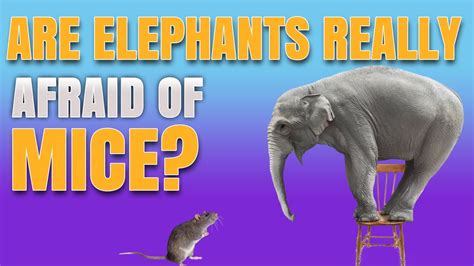The notion that elephants are afraid of mice is a long-standing myth that has been passed down for generations. It's a tale that has been retold in various forms of media, from cartoons to films, and has become a popular cultural reference. But is there any truth to this claim? In this article, we'll delve into the world of elephants and mice to uncover the surprising truth behind this enduring myth.
The Origins of the Myth

The idea that elephants are afraid of mice dates back to ancient times. One of the earliest recorded references to this myth can be found in the writings of the Greek historian Pliny the Elder. In his book "Naturalis Historia," Pliny describes how elephants are terrified of mice, citing the fact that mice can crawl into the elephant's trunk and cause them distress. This account was later echoed by other ancient writers, including the Roman naturalist Aelian.
The Scientific Perspective
Despite the persistence of this myth, there is little scientific evidence to support the claim that elephants are afraid of mice. In fact, many experts believe that the idea of elephants being afraid of mice is nothing more than a legend with no basis in reality.
One of the primary reasons why elephants may not be afraid of mice is due to their natural habitat and behavior. Elephants are large, social animals that live in a variety of environments, from savannas to forests. They are not typically found in areas where mice are abundant, and as such, they have not developed a natural fear of these small rodents.
Furthermore, studies have shown that elephants are not easily startled or frightened by small animals, including mice. In fact, elephants have been known to coexist peacefully with a variety of animals, including birds, reptiles, and even small mammals.
The Psychology of Fear

So, why do we persist in believing that elephants are afraid of mice? The answer may lie in our own psychological biases and cultural influences. Fear is a complex emotion that is shaped by our experiences, environment, and social conditioning.
One possible explanation for the enduring myth of the elephant's fear of mice is the concept of "animacy." Animacy refers to the way in which we attribute human-like qualities to animals, including emotions and behaviors. By attributing fear to elephants in response to mice, we may be projecting our own fears and anxieties onto these animals.
The Role of Culture and Media
The myth of the elephant's fear of mice has also been perpetuated by popular culture and media. From cartoons to films, the image of an elephant running away from a mouse has become a familiar trope. This portrayal has been reinforced by various forms of media, including literature, art, and advertising.

The impact of media on our perceptions of animals should not be underestimated. By portraying elephants as fearful of mice, we may be perpetuating a myth that has no basis in reality.
Conclusion

In conclusion, the myth of the elephant's fear of mice is a fascinating example of how our cultural and psychological biases can shape our perceptions of animals. While there is little scientific evidence to support this claim, it remains a persistent and enduring myth that continues to capture our imagination.
As we strive to understand the natural world and the animals that inhabit it, it's essential to separate fact from fiction and to approach these topics with a critical and nuanced perspective.






Gallery of Elephant and Mouse Images
We hope you've enjoyed this article and the accompanying images. Remember to always approach topics with a critical and nuanced perspective, and don't hesitate to share your thoughts and opinions with us.
Are elephants really afraid of mice?
+No, there is little scientific evidence to support the claim that elephants are afraid of mice.
Why do we persist in believing this myth?
+The myth of the elephant's fear of mice may be perpetuated by our own psychological biases and cultural influences.
What can we learn from this myth?
+We can learn the importance of approaching topics with a critical and nuanced perspective, and not perpetuating myths that have no basis in reality.
